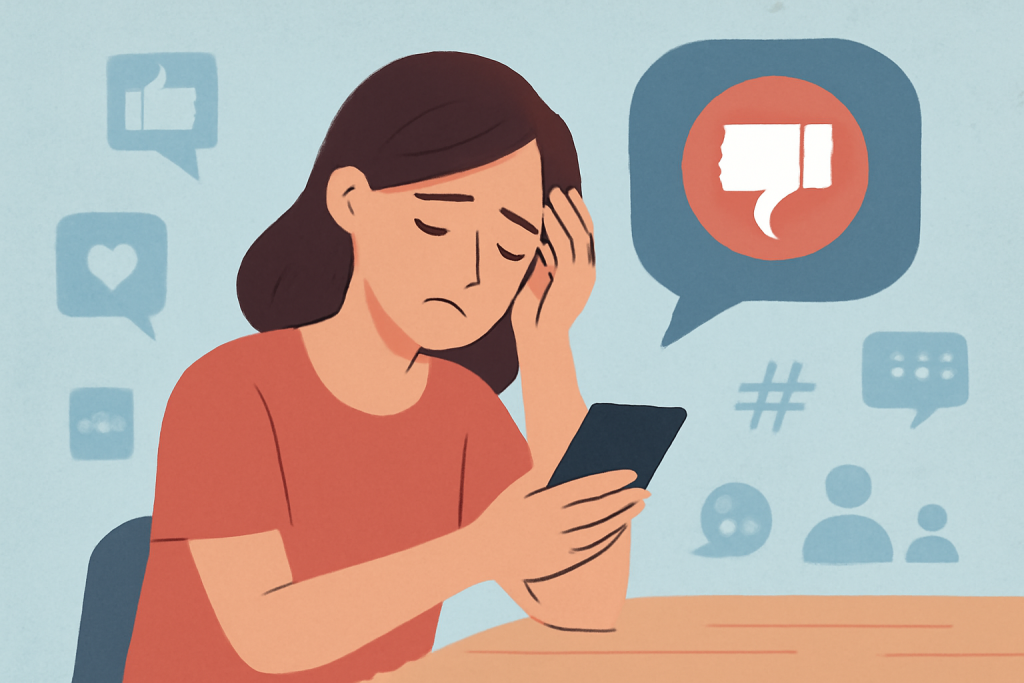The Power of Disconnecting From Social Media for Mental Health
Natalie Brooks August 5, 2025
In today’s hyper-connected world, the line between real life and digital life has blurred. Social media platforms, like Instagram, Twitter, and Facebook, have become an integral part of our daily routines, from staying connected with friends to keeping up with the latest trends. However, with the increasing dependence on these platforms, concerns about their impact on mental health have become more prominent. More people are discovering the power of disconnecting from social media for mental health. Could taking a break from the constant flood of information actually be the key to improving mental well-being? Let’s dive deeper into how stepping away from social media can benefit your mental health.

The Rise of Social Media and Its Impact on Mental Health
The rise of social media has undeniably changed the way we communicate and interact with the world. It offers a sense of connectivity, a virtual space where people can share their experiences, ideas, and thoughts. For many, it becomes a tool for self-expression and a source of entertainment. However, the dark side of social media can also significantly affect mental health.
Several studies have linked excessive use of social media with various mental health issues, such as anxiety, depression, loneliness, and poor sleep quality. The constant need for validation, whether through likes, comments, or followers, can lead to feelings of inadequacy, especially when individuals compare their lives to the seemingly perfect lives of others.
Research indicates that people who spend more time on social media often report feeling more isolated and stressed (Primack et al., 2017). The cycle of scrolling through curated content can create unrealistic expectations and a distorted sense of reality, leaving users feeling overwhelmed and disconnected from their own lives.
The Benefits of Disconnecting from Social Media
While social media platforms continue to grow in influence, there is a growing movement advocating for unplugging and taking a break from the digital world to restore mental well-being. Here are some compelling reasons why disconnecting from social media can be a game-changer for your mental health:
1. Reduced Stress and Anxiety
One of the immediate benefits of disconnecting from social media is the reduction of stress and anxiety. Social media is a constant source of information, and the pressure to keep up with the latest trends, news, and updates can lead to information overload. This overload triggers a fight-or-flight response, leading to elevated levels of stress. By stepping back from social media, individuals can regain control of their emotional and mental state.
A study published in the Journal of Social and Clinical Psychology found that limiting social media usage to 30 minutes per day significantly reduced feelings of anxiety and depression (Hunt et al., 2018). The break from constant notifications and the elimination of comparison with others allow users to focus on their immediate surroundings, which has been shown to improve overall mental health.
2. Improved Sleep Quality
Social media has been linked to poor sleep hygiene. The blue light emitted from screens can interfere with the production of melatonin, a hormone that helps regulate sleep patterns. Moreover, many people check their social media accounts late at night, making it harder to wind down and fall asleep.
By disconnecting from social media, especially before bedtime, individuals can significantly improve their sleep quality. Studies suggest that taking a break from social media can reduce sleep disturbances, leading to better overall health (LeBourgeois et al., 2017). The reduction in screen time allows the body to produce melatonin naturally, leading to a more restful night’s sleep.
3. Increased Mindfulness and Presence
When people disconnect from social media, they often find themselves more present and engaged in the real world. Social media can be a constant distraction, leading people to miss out on precious moments with family, friends, and even with themselves. Disconnecting helps individuals reconnect with their surroundings and the people they care about.
Being more present in the moment increases mindfulness, a practice that has been shown to improve mental well-being. Mindfulness helps reduce stress, increase emotional regulation, and enhance overall happiness. By stepping away from the endless scroll of social media, individuals can refocus on their personal goals and priorities, which often leads to a sense of fulfillment and satisfaction.
4. Enhanced Self-Esteem and Confidence
Social media platforms often present a curated, polished version of people’s lives, which can lead to comparisons and negative self-evaluations. People tend to measure their worth based on the number of likes, comments, and followers they receive. This comparison can lead to feelings of inadequacy and lowered self-esteem.
Taking a break from social media removes these comparisons and allows individuals to focus on their own accomplishments and growth. By disconnecting, individuals can return to their own unique journey without the pressure of external validation. Over time, this can boost self-confidence and a more authentic sense of self-worth.
Practical Tips for Disconnecting from Social Media
If you’re considering disconnecting from social media for your mental health, here are some practical tips to help you get started:
1. Set Boundaries
You don’t have to go completely off the grid. Set specific time limits for social media use each day. Start small by reducing your daily usage by 15 minutes or an hour, and gradually build up to a longer break. You can also designate certain hours of the day, such as during meals or before bed, as social media-free zones.
2. Turn Off Notifications
Notifications can trigger a compulsive need to check your phone. By turning off notifications, you can take back control of your time and attention. Only check social media when you intentionally choose to do so, rather than constantly reacting to pings and alerts.
3. Replace Social Media with Positive Activities
During your break from social media, engage in activities that nurture your well-being. Exercise, read a book, practice meditation, or spend time with loved ones. These activities help improve your mental health and give you a sense of purpose and fulfillment that social media often cannot provide.
4. Use Technology to Your Advantage
If you find it difficult to stay away from social media, consider using apps that help you limit your screen time. Apps like Screen Time for iOS or Digital Wellbeing for Android allow you to track and limit the amount of time spent on social media platforms.
5. Seek Support
If you’re struggling to disconnect from social media, consider talking to a therapist or counselor. They can help you explore the emotional and psychological reasons behind your social media use and offer strategies to create healthier digital habits.
Conclusion: The Wellness Revolution of Disconnecting
The power of disconnecting from social media is not a new concept, but it’s gaining more attention as people recognize the detrimental effects constant online presence can have on mental health. The benefits are clear: reduced anxiety, better sleep, increased mindfulness, and improved self-esteem. By taking control of your relationship with social media, you can restore balance to your life and prioritize your mental well-being.
It may be difficult at first to step away from the constant flood of information, but the rewards of disconnecting are more than worth it. In the end, true wellness comes from finding balance in all areas of life — and sometimes, that means taking a step back from the digital world to focus on the real one.
References
- Hunt, M. G., Marx, R., Lipson, C., & Young, J. (2018) No More FOMO: Limiting Social Media Decreases Loneliness and Depression. Available at: https://www.researchgate.net (Accessed: 5 August 2025).
- LeBourgeois, M. L., Hale, L., Chang, A. M., & Montgomery-Downs, H. E. (2017) Linking sleep to social media use: A review. Available at: https://www.sciencedirect.com (Accessed: 5 August 2025).
- Primack, B. A., Shensa, A., Sidani, J. E., Whaite, E. O., Lin, L., Rosen, D., Colditz, J. B., Radovic, A., & Miller, E. (2017) Social Media Use and Perceived Social Isolation Among Young Adults in the U.S. Available at: https://www.ajpmonline.org (Accessed: 5 August 2025).







